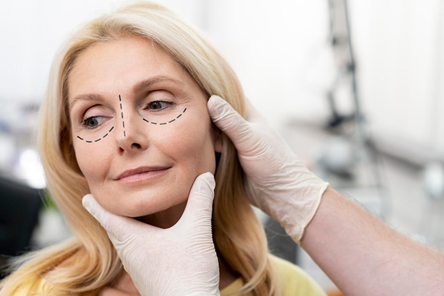Facial plastic surgery can bring both excitement and anxiety, making mental health support essential alongside physical changes. This article examines the psychological impact of surgery, the importance of pre-operative mental health assessments, and strategies for managing anxiety. Post-surgery, we’ll explore available resources and the role of therapists in supporting patients. By highlighting the link between mental health and physical transformation, this piece emphasizes the need for a holistic approach to ensure a fulfilling experience.
Understanding The Psychological Impact Of Facial Plastic Surgery
Facial plastic surgery can evoke various psychological responses, as the desire for change is often linked to self-esteem and body image. While some patients experience a confidence boost, others may struggle with unmet expectations, leading to disappointment. Open communication with surgeons about realistic outcomes is key. Societal pressures and beauty standards, especially from social media, can heighten mental health concerns, making it essential for patients to approach surgery with a healthy mindset and strong support system.
Importance Of Mental Health Assessment Before Surgery
Before undergoing facial plastic surgery, a mental health assessment is vital to identify psychological conditions that may affect the surgery’s outcome. Issues like depression, anxiety, or body dysmorphic disorder can impact expectations and satisfaction. The process, which typically includes interviews and questionnaires to gauge motivations and emotional readiness, is recognized as essential by a trusted facial plastic surgeon in North Texas. This helps healthcare professionals provide tailored support and prepare patients for the changes ahead, ensuring a holistic approach that enhances overall satisfaction and well-being.
Ways To Support Mental Well-Being During The Decision-Making Process
Navigating the decision-making process for facial plastic surgery can be overwhelming, but support from family and friends is key to boosting confidence. Open conversations about feelings and expectations create a safe space to understand motivations and clarify desired changes. Self-reflection, such as journaling, helps confront anxieties and recognize positive affirmations, leading to more informed decisions. Additionally, accessing educational resources about the procedures, risks, and realistic outcomes can reduce anxiety and increase confidence. Many clinics offer informational sessions or consultations to answer questions and provide clarity.
Coping Strategies For Managing Pre-Surgery Anxiety
Pre-surgery anxiety is common for those considering facial plastic surgery, but there are effective strategies to manage it. Mindfulness practices like meditation and deep breathing exercises can help calm the mind and reduce stress. Engaging in physical activity, such as walking, yoga, or group fitness classes, also alleviates anxiety by releasing mood-boosting endorphins. Additionally, seeking professional guidance from a therapist can provide tools for managing anxiety. Cognitive-behavioral therapy (CBT) can help patients challenge negative thoughts, reframe their perspectives, and approach the surgery with greater calm and confidence.
Post-Surgery Psychological Considerations
The period following facial plastic surgery can bring a mix of emotions, from excitement to uncertainty. Emotional fluctuations are common as patients recover physically and adjust psychologically. Patients may experience self-doubt or anxiety, especially if the results don’t meet expectations. Regular follow-ups with mental health professionals provide vital support, while a strong network of family, friends, or online communities offers reassurance and helps with emotional recovery and adaptation to the new appearance.
Mental Health Resources For Patients Undergoing Facial Plastic Surgery
Access to mental health resources is crucial for those considering or recovering from facial plastic surgery. Support groups provide community, helping patients share experiences and reduce isolation. Many clinics now offer pre-operative counseling and post-operative follow-ups with therapists specializing in cosmetic surgery. This holistic approach addresses both physical and emotional needs. Online platforms also offer valuable information, articles, and testimonials, connecting patients with mental health professionals to guide them through their journey.
The Role Of Therapists Or Counselors In The Process
Therapists and counselors are essential for individuals considering facial plastic surgery, guiding them through the emotional complexities of the process. In pre-operative sessions, they help patients clarify their motivations and address emotional challenges that may affect their decisions. By providing coping strategies and tools for self-reflection, therapists empower patients to make informed choices. Post-surgery, they offer continued support, helping patients adjust to their new appearance, process emotions, and manage feelings of disappointment or anxiety. This ongoing support fosters resilience, ensuring patients feel emotionally supported throughout their journey.
Self-Care Practices For Maintaining Mental Wellness Throughout The Journey
Incorporating self-care practices into the facial plastic surgery journey is crucial for mental wellness. Activities like a calming morning routine, hobbies, or spending time in nature can improve emotional well-being. According to Kimball Health Services, maintaining a healthy lifestyle with a balanced diet, hydration, and sleep supports stability. Regular exercise boosts mood and reduces anxiety, while mindfulness and meditation help manage stress. Prioritizing self-care fosters calm and clarity, enhancing mental health throughout the process.
Testimonials From Patients On The Benefits Of Mental Health Support
Hearing firsthand accounts from patients highlights the importance of mental health support during facial plastic surgery. One patient shared that talking to my therapist helped me clarify my motivations and boosted my confidence. Another noted therapy’s role in managing pre-surgery anxiety: Breathing exercises helped me stay calm on surgery day. Post-surgery, a patient remarked, I had mixed feelings, but talking to my therapist helped me accept my new appearance. These stories underscore the value of mental health resources in achieving positive outcomes and emotional well-being.
Conclusion And The Holistic Approach To Facial Plastic Surgery
In conclusion, facial plastic surgery involves both physical and emotional aspects, making mental health support essential as patients make decisions, manage anxiety, and adjust post-surgery. Integrating mental health assessments, coping strategies, and ongoing support can enhance the experience and satisfaction. A holistic approach encourages communication and self-reflection, helping patients move forward with confidence. Prioritizing mental health alongside physical enhancements promotes lasting emotional well-being and ensures patients feel valued and supported as the field evolves.








Comments